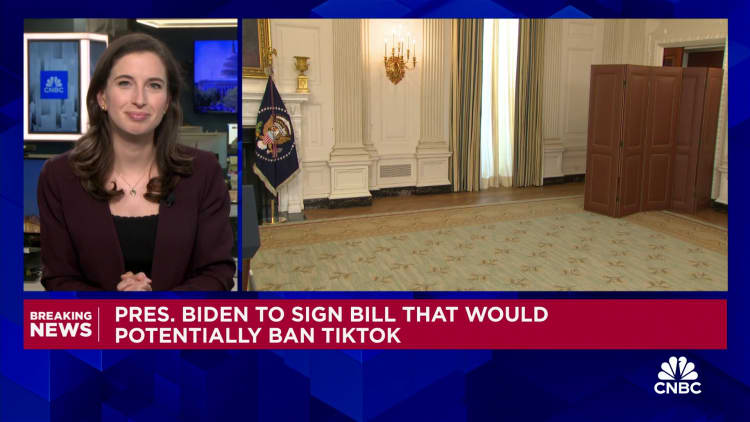Since President Biden signed sweeping climate legislation into law more than a year ago, the United States has seen a surge in clean energy projects, representing more than $200 billion in new investment. But the election and the possibility of a Republican takeover raise concerns that key parts of the law could be upended.
Former President Donald J. Trump, the front-runner for the Republican nomination, has repeatedly attacked key elements of the Inflation Reduction Act, including tax credits for the purchase of electric vehicles. As a result, business leaders have increasingly faced questions in recent weeks about whether the legislation might be rolled back or changed in ways that could impact their clean energy investment decisions.
Republican lawmakers have unsuccessfully tried to repeal much of the law since it passed entirely with Democratic votes in 2022. Business officials and energy researchers say a wholesale repeal of the law remains unlikely because many new projects are creating jobs and investment in Republican districts.
But a Republican administration would most likely try to influence the programs in other ways, such as through regulatory changes that would not require congressional action. This could have a significant impact on which companies and industries benefit from the programs and could hinder the Biden administration’s achievement of its climate goals.
“We have to win the presidency and both chambers” of Congress, said Rep. Frank Pallone Jr., the top Democrat on the House Energy and Commerce Committee. “Otherwise everything will be on the rocks.”
The Inflation Reduction Act includes various tax credits and other subsidies to incentivize companies to implement more clean energy projects. It also includes tax breaks for consumers to offset the costs of electric vehicles, heat pumps and other energy-efficient equipment.
Thomas Pyle, president of the American Energy Alliance, which represents fossil fuel interests, said a “large portion” of the law’s provisions were most likely on Republicans’ “target list.”
For example, a new administration could impose stricter requirements on the types of electric vehicles that qualify for the $7,500 tax credit, Mr. Pyle said. Some Republican lawmakers have already pushed for stricter limits on electric vehicle components to boost domestic production and reduce the country’s dependence on China. That could reduce the number of vehicles registered and potentially hinder progress toward the Biden administration’s goal of electric vehicles accounting for half of new car sales by 2030.
Kevin Book, managing director at ClearView Energy Partners, said a Republican administration could also try to limit the locations eligible for tax credits that offset the cost of installing electric vehicle charging stations. The Biden administration has released guidance that would allow a wide range of locations to qualify, covering much of the country outside major cities.
Mr. Trump has attacked key aspects of the law during the campaign, including the electric vehicle tax credits, which he said were reserved for “rich people” to buy “luxury electric cars.”
“We are a nation whose leaders are demanding all electric cars even though they don’t go far, cost too much and their batteries are made in China,” Trump said at a rally in New Hampshire last month.
He has also taken aim at wind power, arguing that natural gas is a much cheaper option and that wind turbines are “ruining our plains and fields.”
The Trump campaign did not respond to repeated requests for comment.
Questions about a possible withdrawal of the law have appeared in companies’ earnings calls. In January, John Ketchum, CEO of NextEra Energy, an energy company that develops and operates renewable projects nationwide, was asked about the sustainability of the Inflation Reduction Act’s provisions in the event of a “Republican trifecta.” In response, Mr. Ketchum said he thought repeal was unlikely because many of the benefits would go to Republican states and rural communities.
“It’s certainly beneficial to Democrats for obvious reasons, but it’s also a big advantage to Republicans,” Mr. Ketchum said.
For now, executives from clean energy companies are betting that Republicans would have a hard time repealing the law even if they controlled both chambers of Congress. Since the passage of the Inflation Reduction Act, more than half of announced major clean energy projects and 67 percent of all associated jobs announced have been located in Republican counties, according to an analysis by E2, an environmental nonprofit.
“It’s not like it’s going to be a walk in the park for Republicans to do this,” Mr. Pyle said.
And some legislative changes could be welcomed by American industry.
A Republican administration could make it easier for companies to access lucrative tax credits for producing hydrogen, said Sasha Mackler, executive director of the energy program at the Bipartisan Policy Center. Biden administration officials have proposed strict limits on the credit to encourage hydrogen production with the lowest impact on carbon emissions. Most hydrogen is currently produced from natural gas, through a process that produces greenhouse gases. Environmental groups and some hydrogen developers have praised the rules, but other companies and industry groups have criticized the proposal.
David Carroll, chief renewables officer at Engie North America, an energy company that builds and operates utility-scale solar, wind and battery storage projects, said in an interview that officials would monitor possible rollbacks “very, very closely.” While he acknowledged that the law could potentially be rolled back or changed, he said the number of jobs it created in Republican-led states like Indiana and Texas would most likely play a big role in lawmakers’ decision-making.
“If you look closely at our development portfolio and the ways we’ve invested, it primarily benefits Republican districts,” Carroll said.
White House officials have made the same point when warning of Republican attempts to change the climate law.
“Extreme Republicans in Congress would harm their own constituents if they repeal the Inflation Reduction Act, which would shift more than 100,000 jobs already created to their districts while increasing the prices of prescription drugs, health care and utility bills,” said Michael Kikukawa , a White House spokesman. said in a statement.
Still, there is expectation among energy researchers and business groups that Republicans would seek to roll back parts of the law, in part because lawmakers will seek to offset the costs of extending the Trump tax cuts, which are set to expire in 2025. The estimated cost of the Inflation Reduction Act’s energy stimulus has effectively doubled since its passage, largely because forecasters expect the bill to gain more support than they originally expected.
Lori Esposito Murray, president of the Conference Board’s Economic Development Committee, said the issue was reminiscent of Republicans’ repeated attempts to repeal the Affordable Care Act, which has undergone some changes but has largely remained a “viable program.”
“Business leaders need to remember that policies can change,” Ms. Murray said. “How significant these changes will be remains to be seen.”
Jeanna Smialek contributed reporting.
Source link
2024-02-19 20:10:03
www.nytimes.com







